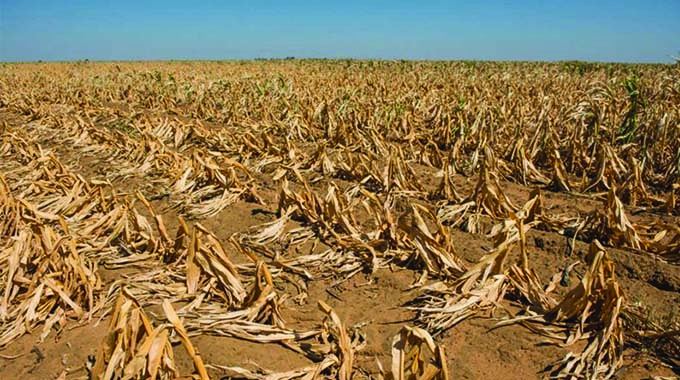More concerted anti-drought measures a must

Stephen Mpofu
VILLAGERS in dry regions of Zimbabwe ravaged by drought must for their survival and that of urban dwellers who rely on them for food return to the 16th century before Portuguese traders introduced maize to Africa from Mexico in order to effectively combat death threats on the back of the current climate change onslaughts.
Before the white grain’s advent, Africans lived off small grains such as millets, sorghum and the like and hunger was a strange phenomenon then.
However, the triumphant arrival of maize which upstaged small grains in monetary terms on the marketplace while displacing small grains as prime dishes on the dinner tables and virtually shoving them into the shade, as it were, left no possibilities in the minds of peasants about future climate change as we now experience with devastating effects.
It was, for instance, unbeknown to Africans that industries in developed nations were spewing dangerous gasses from their unmodified factory chimneys and open coal plants into the atmosphere.
In the process, they rendered ozone, the layer that protects earth from dangerous rays of the sun, wafer-thin with the result that heat released caused perennial droughts such as that being experienced in our country and elsewhere with food shortages for human beings and livestock.
Worse still, some big boys from the West withdrew from the Paris Climate Change Agreement meant to curb the causes of climate change. This had devastating effects on humanity and, instead of modifying their factories, they let things go on dangerously as before with some people on our continent and elsewhere guilty of deforestation when they ought to know that trees absorb and sink dangerous gasses released from unmodified factory chimneys and refrigerators into the atmosphere thereby reducing the effects of climate change.
Today drier regions of Zimbabwe and of other countries in southern Africa are gripped by droughts with dire consequences for human beings and livestock as climate change rears its very ugly head as it were.
Which must of necessity cause our people to return to the drawing board and have small grains such as sorghum and millets resuming their reign on the dinner table from their relegation to beer bowls to which they were mostly relegated by the white grain, maize playing king, courtesy of Africans’ appetite for money and their gullibility for the maize dish on the dinner table.
Yes, people in drought affected areas are almost daily urged through radio to go back, full-fledged, to growing small grains in order to offset the effects of droughts.
In colonial Rhodesia, agricultural demonstrators based among villagers supervised the people in implementing requirements by their government for appropriate food and fruit tree production for the benefit of the population. This is something that members of parliament, traditional leaders and agricultural experts must do and be seen to be doing today to alleviate hunger and suffering among villages and urban dwellers who mostly rely on agricultural food supplies.
Recent radio reports have indicated that in addition to food insecurity rendered by droughts in other parts of southern Africa, heatstroke is a major death threat to drought affected people in our region.
Here in Zimbabwe, people are often urged on radio to drink two litres of water against dehydration and that is all very well.
But, surely, health experts must also urge people in drought-stricken areas to seek medical attention without delay when that need arises to avoid the worst consequences.
In urban areas, the powers that be might wish to take measures to ensure that factory chimneys in our industries are modified so that our country does not also stand accused of depleting the ozone layer and in the process contributing to climate change which, as is already known, renders maize vulnerable.
Otherwise this will be the top musical tune for years, as it were, for both commercial and peasant farmers, who, with many of the latter relegating small grains which are resistant to drought to beer brewing because of their inability to deter swarms of small winged monster quelea birds that literally wipe off some small grains.
Or is modern technology incapable of trapping the birds en masse to help people’s diet and/or earn an income for peasants from sales of the trapped birds to urban dwellers for relish.








Comments